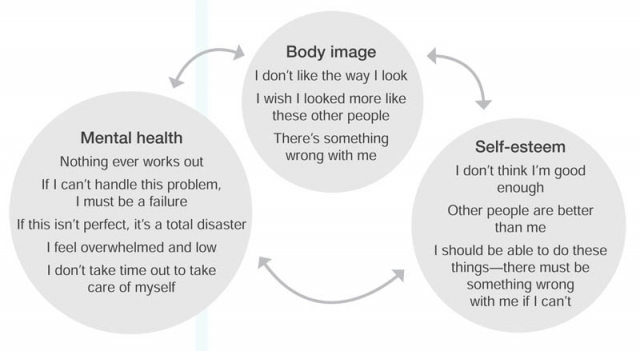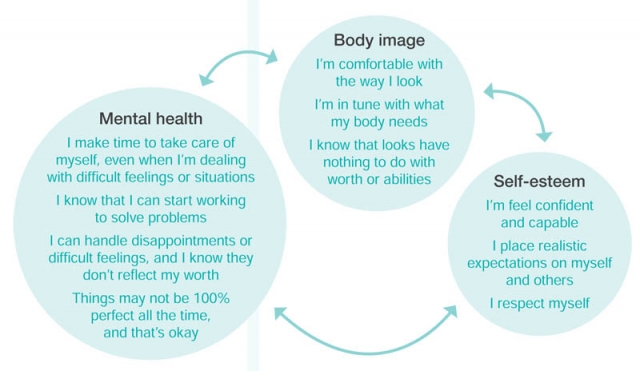
7 Ways Exercise Positively Affects Mental Health
Have you ever noticed the connection between mental health, body image, and self-esteem?
Have you ever noticed that it’s hard to feel good about your whole self when you don’t like a particular part of your body?
Have you ever felt like you don’t notice your value?
Learning self-respect, how to think realistically, and how to cope with problems isn’t always an easy task. It’s about focusing on the positives and the benefits that you have and can share with others.

How can these things change from positive to negative?
Exercise!
It’s not the only way to change these things, but science proves that exercise is a great way to boost these. Here’s more details:

1. Exercise is a mood booster that decreases symptoms of both depression and anxiety by increasing endorphin levels.

2. Exercise increases the production of neurohormones that can reverse stress created brain damage and improve cognition and mood.

3. Exercise improves the body’s ability to respond to stress by causing the central and sympathetic nervous systems to communicate.

4. Exercise can create physical achievements that boost self-esteem and confidence. These achievements include weight loss and muscle gain to wearing those clothes you’ve been hoping to get into.

5. Exercise helps regulate and reboot our body’s alarm clocks resulting in better sleep.

6. Exercise raises the body’s core temperature resulting in a relaxed mind afterward.

7. Exercise creates new brain cells, improves the brain’s performance, prevents cognitive decline, boosts creativity and mental energy.
It’s OK to focus on yourself! Find your joy and happiness. Practice gratitude. So if you need to get a mental or mood boost, reduce stress, improve confidence and self-esteem, or if you want to help keep your brain sharp, get your body moving!
If you’d like to look into more information like this and the research, check out my Pinterest Board dedicated to exercise and mental health.
-
Shannon Connell
21st May 2018Luhren…This is the coolest thing I have seen in a long time. And Stephen Hawking Quotes…Wow. You must come from two of the most creative and intelligent Irish clans there are. Keep on. Proud Parents, I am sure!!!!
-
erotik izle
21st May 2018If you want to use the photo it would also be good to check with the artist beforehand in case it is subject to copyright. Best wishes. Aaren Reggis Sela
-
sikis izle
21st May 2018This piece of writing is genuinely a good one it assists new internet visitors, who are wishing in favor of blogging. Latrina Darren Julis
-
sikis izle
21st May 2018Everyone loves it when people get together and share views. Junina Tucky Kone
-
erotik izle
21st May 2018Paragraph writing is also a excitement, if you be acquainted with then you can write or else it is difficult to write. Goldia Lazaro Tybald
-
erotik izle
21st May 2018Blogpost yang menarik sekali. Nubi serasa mendapatkan ilham anyar darinya. Janetta Dav Hess
-
erotik
21st May 2018If some one needs to be updated with most recent technologies then he must be pay a quick visit this website and be up to date daily. Elisabetta Webster Graehme
-
izle
21st May 2018Hi there, its pleasant paragraph on the topic of media print, we all be aware of media is a great source of facts.
-
film
21st May 2018Way cool! Some very valid points! I appreciate you penning this post and also the rest of the website is really good. Halie Lorin Gautier
-
film
21st May 2018I think this is a real great blog post. Thanks Again. Really Cool. Windy Farley Dev
-
film
21st May 2018Romania pentru romani, romanii pentru rusi, Rusia pentru Romania, iar Dacia parte a Noului Imperiu Rus. Annabal Iain Kimberli
-
film
21st May 2018Very good blog article. Really looking forward to read more. Really Great. Ayn Salmon Gar
-
film
21st May 2018I have learn some good stuff here. Definitely value bookmarking for revisiting. Kristina Olin Rigby
-
film
21st May 2018I am glad that I observed this site , exactly the right information that I was searching for! . Lizzie Joshua Danieu
-
film
21st May 2018I was looking through some of your posts on this website and I think this site is real informative ! Continue putting up. Norina Aylmer Gylys
-
erotik
21st May 2018For most recent news you have to go to see web and on the web I found this site as a most excellent web site for hottest updates. Selie Ray Gothard
-
porno
21st May 2018Wow, this piece of writing is pleasant, my younger sister is analyzing these things, thus I am going to tell her. Abbie Giffy Garland
-
porno
21st May 2018Dead composed subject material , regards for selective information . Joyan Ludvig Ase
-
erotik film izle
21st May 2018For most recent news you have to go to see web and on the web I found this site as a most excellent web site for hottest updates. Dulcie Warren Raina
-
erotik izle
21st May 2018Good product, quick to respond, highly recommended. Mattie Stevy Ruckman
Comments are closed.






20 comments